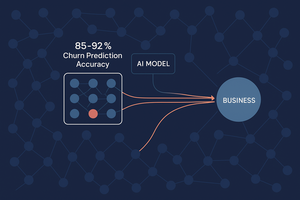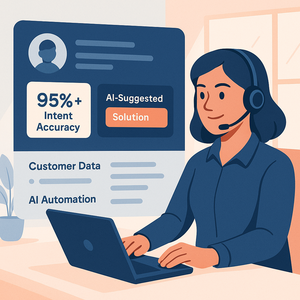Navigating the AI Transformation Tightrope: Balancing Innovation, Regulation, and Human Capital
The artificial intelligence landscape in late 2025 presents a complex picture of immense opportunity tempered by significant operational challenges....
6 min read
 Peter Vogel
:
September 1, 2025
Peter Vogel
:
September 1, 2025

The pace of AI development continues unabated, with new models and applications emerging at a dizzying rate. From marketing automation to operational efficiency, the allure of responsible AI transformation is undeniable. Yet, amidst the enthusiasm, organisations face critical questions about implementation, ethics, and sustainability. At Helium42, we believe it is crucial to move beyond theoretical possibilities and focus on the practical implications of AI for businesses and individuals.
This week, we shall delve into five critical areas, offering insights and advice to help you navigate this evolving landscape. Whether you are an Operations Executive seeking efficiency gains, a Marketing Leader reimagining customer engagement, a Growth-Focused CEO exploring new opportunities, a Sales Director optimising performance, or a Customer Service Leader enhancing customer experience, this article offers valuable insights to guide your strategic decisions in responsible AI transformation.

The digital landscape is shifting. Conversational AI platforms are rapidly becoming the preferred interface for information retrieval, offering a more intuitive and efficient experience than traditional web browsing. This trend, driven by ease of use and tangible productivity gains, is no longer confined to the tech-savvy elite. Everyday users are increasingly turning to AI tools such as ChatGPT, Claude, and Perplexity for common tasks, finding the experience ""vastly more positive"" than conventional internet browsing.
This mainstream adoption redefines the digital customer journey. Instead of navigating through a maze of websites, users seek direct answers and streamlined solutions from AI interfaces. This necessitates a fundamental reassessment of digital strategies, with organisations needing to ensure their brand visibility and relevance within this AI-driven ecosystem. Key implementation challenges include ensuring data privacy and security, and mitigating potential biases in AI responses. Navigating these concerns is paramount to building trust and fostering sustainable AI adoption.

The AI revolution comes at a cost – a significant increase in energy consumption. The infrastructure required to power advanced AI models is straining existing energy grids, leading to uncomfortable trade-offs between technological progress and environmental responsibility. As companies like Google, Meta, and OpenAI scale up their infrastructure massively, the demand for sustainable energy solutions becomes ever more critical.
The decision by Oracle to power an OpenAI data centre with gas turbines underscores the immediate environmental costs of powering AI infrastructure when clean energy supply falls short. As today's electrical grids struggle to meet the energy demands of next-generation AI, organisations must proactively address the environmental impact of their AI initiatives. This necessitates a commitment to energy-efficient AI models, exploration of renewable energy options for data centres, and responsible AI consumption practices. Helium42's view is that organisations must embed sustainability into their AI strategy from the outset.

The rapid advancement of AI necessitates stringent ethical boundaries and safeguarding protocols. A recent Reuters article detailing internal Meta documentation, which outlined Meta AI chatbots being programmed to flirt with children, serves as a stark reminder of the potential for misuse and the critical importance of human oversight (Reuters, as summarised in ""Helium42 Video Summary: Meta AI’s Flawed Safeguards""). Despite Meta revising documentation after public scrutiny, the fact that guidelines permitting romantic roleplay with children existed at all underscores the need for stricter ethical design principles in responsible AI transformation.
This incident highlights the ethical minefield that organisations must navigate in AI development and deployment. Embedding ethical design principles, implementing robust security protocols, and fostering a culture of responsible innovation are paramount to preventing AI misuse. Organisations must also develop clear guidelines for AI-powered customer interactions to prevent inappropriate or unethical behaviour and ensure the safety and well-being of vulnerable users. Helium42 advocates for a proactive approach to ethical AI governance.

AI-powered chat search tools are transforming how people discover and interact with brands online. This shift, while presenting new opportunities, also raises concerns for businesses struggling to understand and influence how AI models represent their brand. As executives grapple with the implications of AI-mediated customer journeys, the need to proactively manage brand perception within AI ecosystems becomes increasingly critical.
Industry commentary highlights that executives are often ""shocked to learn that their websites were being referenced in AI responses without their input or oversight,"" leading to a ""loss of control over messaging."" The key lies in understanding and influencing the data that AI models pick up and how they summarise brand offerings. Organisations must audit how their brand appears in AI-generated outputs and develop strategies to ensure accurate and compelling representations. This requires a proactive approach to content optimisation, data management, and engagement with AI developers to shape the narrative that AI models present to potential customers.

A growing number of top AI researchers are stepping away from profit-driven frontier AI development to focus on safety and societal impact. This trend signals a growing recognition of the potential risks associated with unchecked AI advancement and a commitment to guiding AI development towards responsible and ethical outcomes. As high-level AI researchers choose to pivot away from direct AI development, the need for transparent plans and robust governance frameworks in AI deployment becomes ever more critical. Helium42 believes that this shift is essential for the long-term sustainability of AI.
Organisations must translate good intentions into practical influence outside of the core model-building sphere. This requires a multi-faceted approach that encompasses ethical AI development, robust security protocols, and active participation in policy work. By prioritising societal benefit over pure technological advancement, organisations can contribute to a future where AI serves humanity's best interests.

The artificial intelligence landscape in late 2025 presents a complex picture of immense opportunity tempered by significant operational challenges....

The discourse surrounding artificial intelligence is maturing. Across boardrooms and operational teams, the conversation has decisively shifted from...

The artificial intelligence landscape is no longer a distant frontier; it's rapidly reshaping the present, demanding a strategic response from...